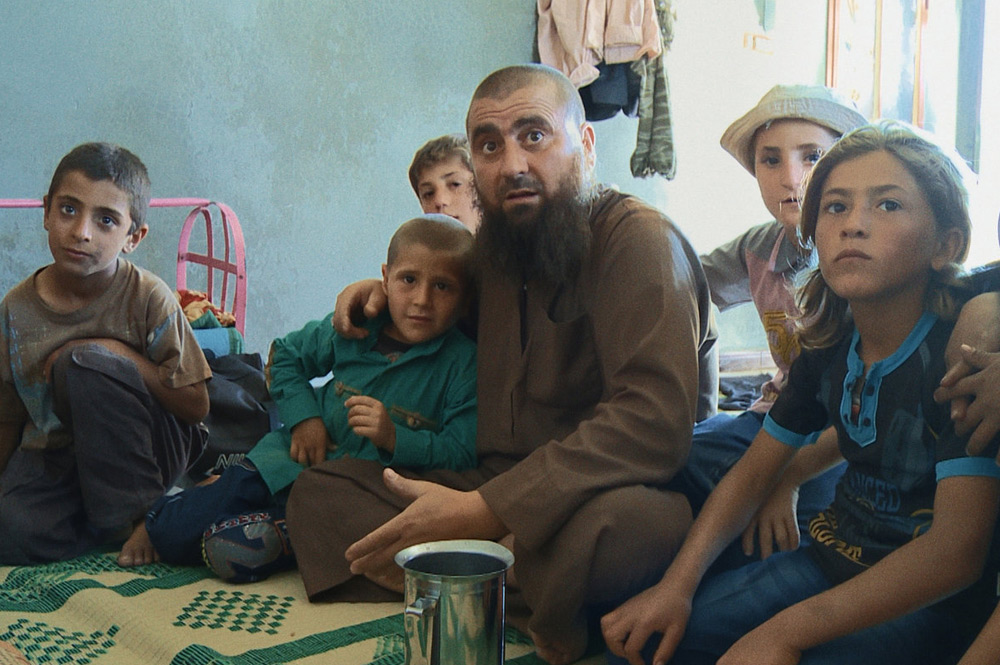OF FATHERS AND SONS
Kino Lorber
Reviewed for Shockya.com by: Harvey Karten
Director: Talal Derki
Screenwriter: Talal Derki
Cast: Abu Osama
Screened at: Crosby St. Hotel, NYC, 11/7/18
Opens: November 16, 2018
What informal outdoor games did you play with your pals when you were a kid? When I was 12 we played stick-ball in the street, watching out for cars and dodging them as best we could. Punch ball was a variety of this without the technology of the stick. We relied on our own fists to knock out what we called spaldeens (acutally Spaldings). My favorite indoor game was spin the bottle. What do kids in Northern Syria do for fun? In their bombed-out country, courtesy of Bashar al-Assad with the help of the Russians, they play war. There’s not much else to do, as we can see from Talal Derki’s sophomore feature documentary. Derki, whose prize-winning 2013 doc “The Return to Homs” filmed over 3 years, is about a 19 year-old militia leader in a city in Syria’s West, virtually destroyed by Assad’s forces. Homs is a city full of history but is now pockmarked, block after block, its citizens largely having deserted.
This time the brave, even audacious Derki spends two years in Northern Syria as a war journalist who feigns sympathies with the jihadists, gains their confidence, and serves up his documentary as though a drama, full of action, with no tedious interviews—just people chatting with the camera as though it were an old friend, presumably excited to give their views to what they think will be millions of movie fans.
There is plenty of hated among the particular family being filmed by the writer-director’s photographer, Kahtan Hassoun, but though you might expect half the movie to be broadsides against America and Israel, only a token conversation bothers to mention the two states. Even stories of Moses and Abraham are treated warmly. Instead the hatred is directed against Bashar al-Assad who destroyed a good deal of his own country, gassing his own people, welcoming Russian jets into his air space to create more havoc against who he calls “terrorists.” What comes across most vividly, however, is something not overtly covered in the film. This is this: while a large percentage of Americans believe that our government should be arming the rebels against the Syrian dictator, it’s possible that most of the rebels themselves are members of a branch of al-Qaida, a terrorist group that may have contempt for ISIS but is just as much in favor of occupying a vast amount of Middle-East space to form an Islamic caliphate.
As principal character, Abu Osama, is proud of his eight sons—his daughters are not part of the conversation at all and in fact the camera captures only seconds of girls in school. He is proudest of the oldest boy, Osama, who he is training along with the others to become, if necessary, martyrs in the fight against the Syrian government. He passes his hatred down to his offspring, who when not play war games with live ammunition, their faces covered by balaclavas, wrestle with one another and practice throwing rocks at invisible enemies. Sadly, for the forty-something father, he steps on a mine and loses a foot, all of which occur during the two-year time period that Derki patiently spends in the company of what we in America would call terrorists.
Abu Osama is no one-dimensional foe. In a nuanced portrait, we see that he has justifiable rage against the Syrian president who obviously does not drop bombs and engage in chemical and biological warfare for fun. Assad is under attack for years now and has no problem gassing people as collateral damage rather than trying to pick out who are the actual combatants. We in the audience could not be blamed for treating Abu Osama as a character we can to some extent sympathize with, a father who is adored by all eight of his male children, who must suffer the loss of a foot with corresponding pain that is not treated with palliatives. The women who are wailing in sympathy are not shown, presumably because Abu Osama would not permit them to be filmed.
Derki, who lives in Berlin and has received considerable funds from Germany for the making of this film, has succeeded admirably with the risk of his own life and limb to capture the lifestyle—if you can call it that—of people under siege in a battle to which they have committed themselves for revenge against the destruction of their country. It is intimate, a fly-on-the-wall treatment of a single family, while broadly capturing the mind of the jihadist close up.
99 minutes. © 2018 by Harvey Karten, Member, New York Film Critics Online
Story – B+
Acting – B+
Technical – A-
Overall – B+






